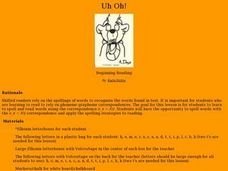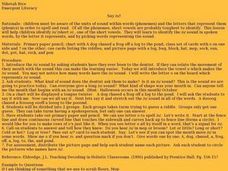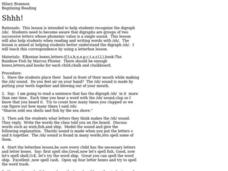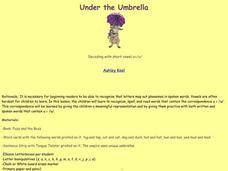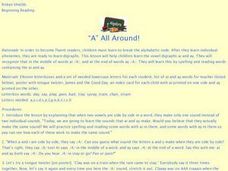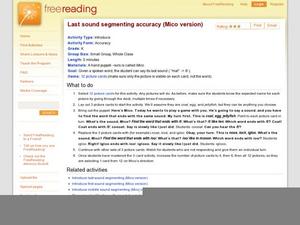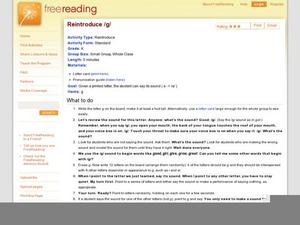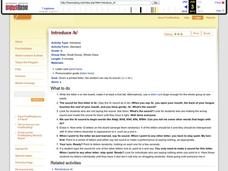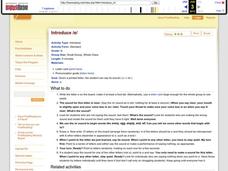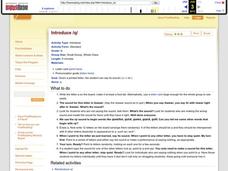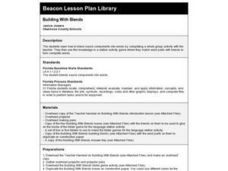Curated OER
Uh Oh!
Help your elementary learners distinguish between short and long vowel /o/ sounds. They are introduced to the vowel-consonant-e pattern that changes short vowel sounds into long vowel sounds. Then they practice reading and spelling words...
Curated OER
Say Aaaah
Using letter boxes and a series of activities, young learners will identify the /o/ sound. Give them the fun tongue twister before having them manipulate letters in the letter box, and then read In the Big Top. Can your learners...
Curated OER
Say /o/
Ollie the octopus is occupied! Use this tongue twister to help youngsters learn the /o/ sound. After practicing the target sound, learners should print the letter. When they are familiar with the letter and its sound, the group will...
Curated OER
Shhh!
What sound do fish and ship have in common? Study the /sh/ sound with your young learners. They hear a common tongue twister, spell words in their letter boxes, and read The Rainbow Fish by Marcus Phister to hear the words in...
Curated OER
Shhhhh, She is Sleeping
The sheep on the ship was shocked by the Fish on the Shore! Can you guess which digraph we're studying? Take a look at the /sh/ sound with your young readers. Have them write words with the target sound in letter boxes, and then small...
Curated OER
Under the Umbrella
The unicorn uses Uncle's underwear! Practice saying this tongue twister with your young learners to illustrated the /u/ sound. After comparing pairs of similar words (like cut and cat) and their sounds, learners will read Fuzz and...
Curated OER
How Many Feet Will We Meet?
Emerging speakers distinguish between the sounds for short vowel /e/ and long vowel /e/. They are introduced to the vowel patterns that comprise the long vowel sounds, with emphasis on /ee/. They practice reading and spelling a variety...
Curated OER
"A" All Around
Spell and read words containing ai and ay. First and second graders identify vowel digraphs in written and spoken language. After a brief discussion on the combinations of letters that comprise digraphs, they practice reading and...
Curated OER
Phonics: Decode and Write Words with Blends
Kids see, say, then count the phonemes they hear in a series of simple words. They practice counting phonemes with the teacher, then sound out the same word on their own. As they count each phoneme they write it down on their paper. A...
Curated OER
Last Sound Segmenting (Mico Version)
Get your scholars excited about phonemes using Mico the puppet; they use the picture cards to examine three words at a time. Mico says the ending sound of one of the words, and learners determine which of them is a match. You'll want to...
Curated OER
Decode and Write Words with More Than One Syllable
Practice sounding out multi-syllable words with this scaffolded lesson. Learners decode words by segmenting them into phonemes and combining the sounds. Your lines are in bold here, but you can easily use this simply as an outline...
Curated OER
Introduce Onset-Rime Blending
Mico (or your favorite puppet) helps emergent readers recognize words from segmented phonemes. Explain to learners that he struggles with pronouncing words and needs their help. Model how Mico segments sounds in single-syllable words....
Curated OER
First Sound Segmenting Accuracy
What's the sound, Mico? Use your class' favorite puppet (in this example, Mico) to teach them about initial sounds in single-syllable words. Using the picture cards provided, choose three and lay them out in front of learners. When Mico...
Curated OER
Introduce /a/
Start your alphabet study strong using these strategies combining pronunciation, recognition, letter sound, and word examples focused on the letter a. Scholars examine the letter shape and listen to you pronounce the /aaa/ sound. As you...
Curated OER
Reintroduce /a/
What does the letter a sound like? Scholars practice with letter sound correspondence by honing their pronunciation of the /aaa/ sound. Use these helpful tips to explain how to make this sound if needed. Then, they brainstorm...
Curated OER
Reintroduce g
Synthesize pronunciation, recognition, letter sound, and word examples as scholars learn all there is about the letter g. They examine the letter shape and listen to you pronounce the hard /g/ sound. As you explain how this sound is...
Curated OER
Introduce Soft-C
Do your emerging readers know that letters sometimes borrow the sounds of other letters? Explore the soft /c/ sound, explaining that c has borrowed the sound from s. After giving scholars some examples of words that begin...
Curated OER
Introduce /k/
Explore the ins and outs of the letter k using these strategies combining pronunciation, letter recognition, and initial phoneme examples. Scholars examine the letter shape and listen to you pronounce the /k/ sound. Use these tips to...
Curated OER
Introduce /e/
Examine the most-used letter in the English language incorporating pronunciation, letter recognition, letter sound, and word examples for the letter e. Scholars examine the letter shape and listen to you pronounce the /eee/...
Curated OER
Introduce /Q/
Everything your pre-readers need to know about the letter Q is right here; this strategy combines pronunciation, letter recognition, sound, and word examples. Scholars examine the letter shape and listen to you pronounce the /kwww/...
Curated OER
Reintroduce /c/
Do you c what I c? Use these strategies combining pronunciation, letter recognition, and initial phoneme examples to examine the letter c with kindergartners. Scholars examine the letter shape and listen to you pronounce the soft...
Curated OER
Building With Blends
Understanding consonant blends is crucial for young readers. In this language arts lesson, learners examine consonant blends, and play the folder game, "Building With Blends," in small groups. The game is especially engaging!
Curated OER
Tongue Twisters
Young readers practice their letter sounds by engaging with this language arts PowerPoint. Six letters are used: p, l, s, w, c, and d. Pupils learn tongue twisters for each letter such as: "Wiggly worm wiggles in the water." Very nice!
Curated OER
What is a Haiku? How Do You Write a Haiku?
Haiku poetry is explored in this language arts lesson. Yong readers identify the characteristics of haiku and read several examples. Students make connections between their study of Japan and the poetic form of haiku, and they write...


